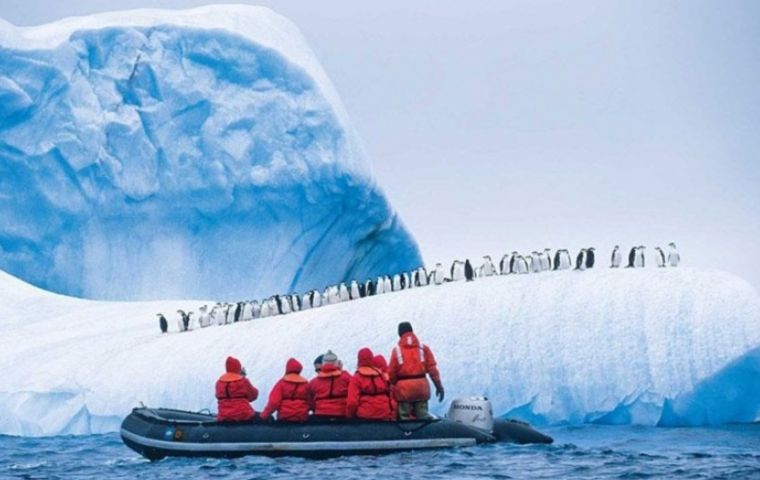MercoPress. South Atlantic News Agency
Ice Patrol HMS Protector is helping to study the impact of tourism on Antarctica
 According to IAATO, during the 2022/23 season more than 104,000 visitors traveled to Antarctica.
According to IAATO, during the 2022/23 season more than 104,000 visitors traveled to Antarctica. The Royal Navy Ice Patrol HMS Protector took scientists on an Antarctic research cruise to analyze the increasing impact of tourism and climate change on the frozen continent, a challenge which has been underlined by IAATO, the International Association of Antarctica Tour Operators. IAATO has pointed out that during the 2022/23 season more than 104,000 visitors traveled to Antarctica.
The majority—more than 71,000 were able to “land” and set foot on the continent, while more than 32,000 visitors were on “cruise-only” voyages. Additionally, around 800 other visitors traveled to “deep field” locations.
HMS Protector was joined by two University of Portsmouth researchers who collected water and rock samples as the first phase of the ice breaker’s annual polar mission took her from the Falkland Islands south along the western edge of the Antarctic Peninsula.
The work of the university’s Professor of Environmental Pollution, Fay Couceiro, and Dr Clare Boston, will ultimately contribute to understanding the impact on Antarctica as record numbers of tourists continue to visit the delicate region.
Professor Couceiro collected water samples at the Falkland Islands, Anvers Island, Port Lockroy, Detaille Island and Pourquoi Pas Island and at the Rothera Research Station, Britain’s biggest facility in Antarctica.
Those samples will be tested for concentrations of micro plastics, metals and nutrients, providing insight into the impact humans may be having on Antarctica.
“What an incredible experience,” said Fay. “Breath-taking scenery, spectacular wildlife, an amazingly friendly and helpful crew, and great food.
“I can’t thank the Royal Navy enough for this opportunity and everyone on HMS Protector for an experience I will never forget.”
Dr Boston, meanwhile, is examining the glacial advances during the last 5,000 years by taking rock samples from Pourquoi Pas Island and, with help from Protector’s hydrographers, collected data in Marguerite Bay to look at landforms created by the Antarctic Peninsula Ice Sheet around 20,000 years ago.
She said: “I’ve had an amazing experience joining HMS Protector, seeing the Antarctic wildlife and collecting data. The crew have worked hard to get me ashore and help me find some rocks.”
On her voyage south, Protector recorded more than 1,000 square miles – an area the size of Dorset – of seabed data in areas that were either uncharted or poorly charted.
This work will increase the safety of seafarers sailing through this region at a time when maritime traffic is significantly increasing – between 2011 and 2020 the number of voyages to Antarctica almost doubled from 234 to 408.
The data collected will all be given to the UK Hydrographic Office for inclusion in charts and navigation publications.
Onward Protector went to Detaille Island, where the UKAHT members would stay for several weeks to carry out conversation work on Base W, a former research station of the British Antarctic Survey that was quickly vacated in 1959 after unstable ice around the island cut scientists off from their supply ships.
Three tons of stores and supplies were ferried ashore by Protector’s Zodiac boats over 48 hours in arduous conditions. Protector will return to Detaille Island in the second phase of her deployment, before returning the UKAHT team back to the Falkland Islands.
“It was a huge privilege to have the opportunity to collaborate with members of the UK Antarctic Heritage Trust and support their mission in delivering essential building materials and supplies for the conservation of historic buildings around the Antarctic Peninsula. An experience I will never forget,” said Lieutenant Commander Lindsey Gascoigne, Protector’s Logistics Officer.
The research station at Rothera is the British Antarctic Survey’s (BAS) logistics centre and a delivery of aviation fuel by Protector is essential to keeping the two aircraft, which shuttle scientists to remote field study sites and provide support to satellite bases in the region, running throughout the season from the station’s 900m runway.
“The team in Protector have willingly worked extremely hard, often in extreme environmental conditions in terms of freezing temperatures, near gale force winds and of course ice,” said Commander Mark Vartan, Protector’s Executive Officer.
“All have put in many long days whether that be feeding hungry mouths, avoiding ice bergs, launching and driving boats or keeping the machinery running without fail, to achieve the mission.
“The satisfaction that we all feel is reflected in the memories and photographs and friendships that have been built through the teamwork with the knowledge that we have achieved what we have been asked to deliver, efficiently and safely.
“Although coming towards the end of the first 2023/24 Work Package, many of us are looking forward to the next work package that will take the ship to South Georgia and the South Sandwich Islands.”




Top Comments
Disclaimer & comment rulesCommenting for this story is now closed.
If you have a Facebook account, become a fan and comment on our Facebook Page!